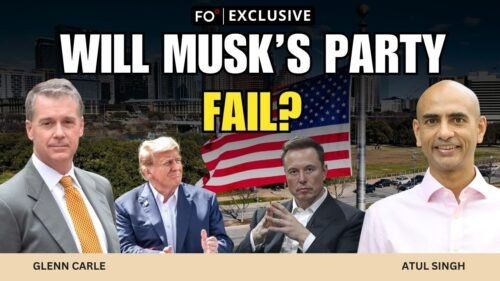Fair Observer Founder, CEO & Editor-in-Chief Atul Singh and retired CIA Officer Glenn Carle open the August 2025 edition of FO° Exclusive with a quick look back at the whirlwind of July. The United States finalized trade agreements with the EU and Japan, a “tectonic diplomatic shift” unfolded on Palestine and the so-called “MAGA [(Make America Great Again)] rebellion” flared over the Jeffrey Epstein files controversy. Those developments set the stage for a tense and turbulent August, where fresh crises broke out across multiple regions.
The war in Gaza and Israeli divisions
The ongoing war in Gaza dominated August’s headlines. Anger over the conflict grew not only worldwide but also inside Israel. Roughly 600 former Israeli security officials — including ex-chiefs of Israel’s Mossad intelligence and Shin Bet security agency, as well as senior Israel Defense Forces generals — sent a letter to US President Donald Trump urging him to pressure Israeli Prime Minister Benjamin Netanyahu to end the fight. They argued Israel had already achieved its military goals against the Hamas terror group and that hostage negotiations could not progress until the war stopped. Further, they could not agree to any deal to release the remaining hostages while the conflict still raged.
Yet Netanyahu’s government stood firm, with hard-right figures retaining sway. Former Israeli government official Josef Olmert's phrase “right-wing nutters” was used to describe their continued grip on policy.
Greenland: Denmark confronts Washington
Another diplomatic headache emerged in the Arctic. Denmark summoned America’s top diplomat over covert US operations in Greenland. These efforts were reportedly led by US intelligence officials, who, in Atul’s words, took “a page out of [Russian President] Vladimir Putin’s book” to move Greenlanders toward closer integration with the US. Copenhagen, Denmark’s capital, viewed the influence operations as a serious breach and summoned the ambassador to lodge a formal protest.
Armenia, Azerbaijan and Trump’s quest for a legacy
Amid the turmoil, Trump appeared to score a diplomatic win. Reportedly, he brokered a peace deal between Azerbaijan and Armenia, a long-running flashpoint after wars in Nagorno-Karabakh and disputes over Nakhchivan, the capital of the Nakhchivan Autonomous Republic — an enclave of Azerbaijan. Azerbaijan had already expelled ethnic Armenians from Karabakh, but the new agreement was cast as an opening for stability.
Europe’s immigration battles
Migration once again inflamed European politics. In Italy, right-wing Prime Minister Giorgia Meloni — labeled “far right, even fascist” by some critics — reacted furiously to a European Court of Justice ruling that struck down her government’s policy of outsourcing migrant processing to Albania.
Meanwhile, Britain and France formalized an arrangement to return illegal migrants crossing the English Channel in small boats. United Kingdom Prime Minister Keir Starmer claimed this “one-in, one-out” system would “send a clear message” to illegal channel-crossing immigrants. Yet Rory Stewart, co-host of The Rest is Politics podcast, argued only wholesale deportations would halt crossings. Nigel Farage, leader of the Reform UK party, pushed even further, proposing a repeal of human rights laws to permit mass expulsions of asylum seekers. He claimed such steps were “absolutely essential” to prevent “major civil disorder.”
Japan’s defense pivot
Japan also made headlines with a $6.5 billion contract to supply advanced frigates to Australia. The ships are highly automated, with crews of only 90 workers — half the crew size of existing Australian vessels. For Tokyo, this was the biggest defense export since it lifted its post-war arms ban in 2014. The move underscored Japan’s push to remilitarize and become a “normal nation,” a shift certain to unsettle Beijing and other regional powers.
Africa and Latin America: overlooked upheavals
In Africa, violence raged in Sudan and the Democratic Republic of Congo with no sign of ending. In Latin America, Bolivia lurched to the right. The Movement Toward Socialism party, dominant for two decades, collapsed to just 3% support. Centrist Rodrigo Paz Pereira led the first round of voting and will face right-wing former President Jorge “Tuto” Quiroga in the runoff.
Elon Musk, Trump and market interference
Tesla CEO Elon Musk’s fortunes were also in the spotlight: The auto manufacturer awarded him shares worth about $24 billion, boosting his stake to 15%, after he threatened to quit. His SpaceX Starship, the world’s most powerful rocket, completed its tenth test flight — it reached outer space and returned to Earth successfully.
Meanwhile, Trump has reportedly considered converting the CHIPS and Science Act into equity, taking a 10% stake in the Intel semiconductor manufacturer. He initially demanded that Intel CEO Lip-Bu Tan step down, but later backed down. He also mocked Goldman Sachs chief David Solomon, criticizing the bank’s tariff forecasts and suggesting Solomon “focus on being a DJ.”
Atul underscores Trump’s paradoxical stance: a self-styled champion of free markets resorting to aggressive state interference.
Tariffs and trade turmoil
On the trade front, Washington and Beijing extended their tariff truce another 90 days, with November 10 set as the next deadline. Conversely, on August 27, Trump blindsided India by slapping 50% tariffs on most Indian exports. FOI, of which Atul is a partner and Glenn a senior partner, had predicted this as early as April 2024, contrary to Indian officials and business leaders who insisted tariffs were impossible given Indian Prime Minister Narendra Modi’s friendship with Trump. “I guess we were right, they were wrong,” Atul gloats.
The three big stories of August 2025
Atul continues by identifying this episode’s three most pressing issues:
- Donald Trump’s Assault on the Federal Government.
- Dramatically Deteriorating US Economic Governance.
- The Story of Alaska and Washington, DC Summits.
[Lee Thompson-Kolar edited this piece.]
The views expressed in this article/video are the author’s own and do not necessarily reflect Fair Observer’s editorial policy.












































Comment